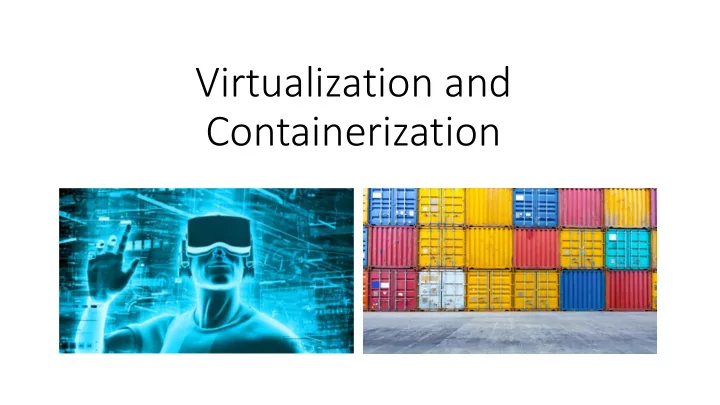

Virtualization and Containerization
At a high level , how do computers work?
Tr Traditional Computers
Take a guess at what Virtualization and Containerization are…
Vir Virtu tualiz alizatio tion
Type 1 (Hardware Level) Type 2 (OS Level)
Characteristics of Virtual Machines • Partitioning • Run multiple operating systems on one physical machine. • Divide system resources between virtual machines. • Isolation • Provide fault and security isolation at the hardware level. • Preserve performance with advanced resource controls. • Encapsulation • Save the entire state of a virtual machine to files. • Move and copy virtual machines as easily as moving and copying files. • Hardware Independence • Provision or migrate any virtual machine to any physical server.
Benefits of Vi Virtualization • Higher performance at a lower cost due to resource optimization • Better security as you can prevent operating systems from communicating to one another • Reduced capital and operating costs • Faster provisioning of applications and resources
Containers!
What are Containers? Lightweight, portable software packages ● Only contain the software, libraries, and other dependencies they require to run so you can put them directly ○ on the host operating system. Smaller version of Virtual Machines, only have the bare necessities ● 20 MB vs 20 GB ○ Operating system kernel via API calls with other containers on a host ● Many Variations ● Most Popular = Docker ○
Containers vs. Virtual Machines
Why Use Containers? Performance ● Without any hypervisor, much more stable without the need of more resources ○ Reliability ● Predictable apps created within containers ○ Distribution ensures anything downloaded works the exact same within container ○ App Isolation ● Developers get exactly what they need, no more no less, only dependencies needed are downloaded ○ Can alter changes within the container but not on the host OS ■ Allows for greater security - Split resources by container ○ Availability ● Can be downloaded anywhere, anytime and on ANY operating system – Very Portable ○ Will work the same way across platforms (Mac, Linux, Windows) ■
Issues with Containerization No isolation from host OS (Docker) ● Root access required ○ Once inside container, have root access ○ Container Malware ● Can be distributed much more easily with containers ○ Denial of Service Attacks ● Multiple containers share same Kernel resources ○ If you can grab kernel resources, can starve all containers on system ○
What’s the Difference ce?? Containers Virtual Machines Consistent Runtime Environment X X Application Sandboxing X X Resource Allocation X X Small Size on Disk X Low Overhead X
Can I use a virtual machine?
Server: cdr-vcenter1.cse.buffalo.edu Username: ad\UBIT Password: UBIT Password
Recommend
More recommend